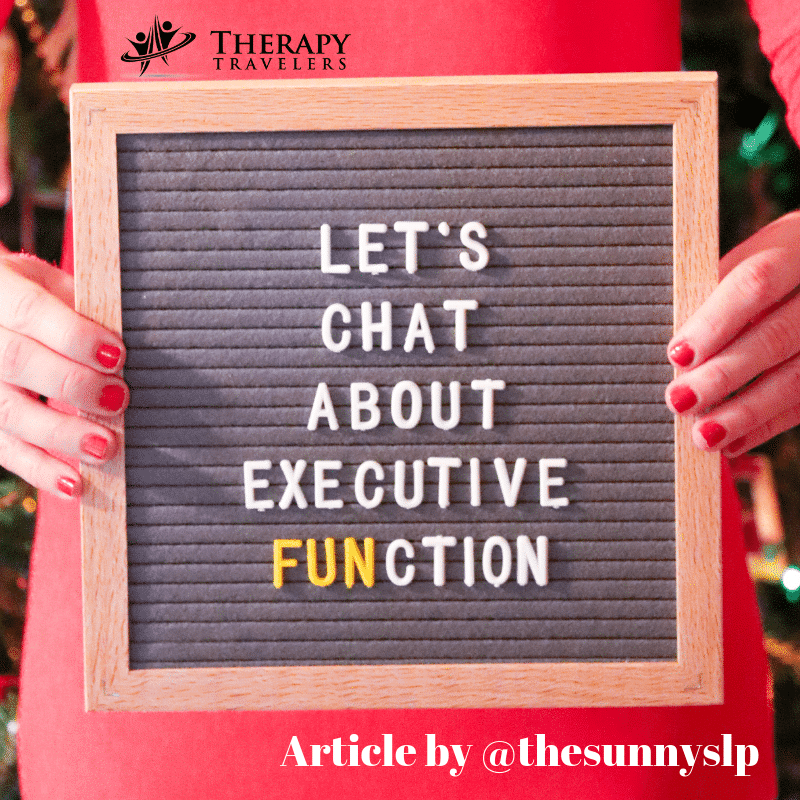
We are so thankful to have connected with @thesunnyslp,
grateful for her extensive study and the article she has provided us on the topic: Executive Function.
Executive Function
By: The Sunny slp
Take Away: Communicating with caregivers and teachers about specific techniques to improve engagement for children with deficits in executive function skills can support reaching academic milestones, therapeutic goals, and decrease frustration.

What is Executive Function?
Executive function is a term used to describe neurological processes such as self-regulation and mental control which impact cognitive and social behaviors. Executive function skills include attention, memory, impulse control, planning/organizational skills, and appropriate pragmatic responses during social and/or stressful situations. Humans are not born with executive function skills because the prefrontal cortex has not fully developed at birth. Executive function skills emerge at differing rates and are constantly growing for young children and adolescents.
Improve Engagement and Participation
How are we making it easier for these children every day in the classroom or at home? We, as SLPs, target therapy tasks focused on executive function skills our clients lack- so let’s advocate for our clients and help teachers and caregivers by giving specific strategies to improve classroom engagement and comprehension of materials. Consider incorporating clear and consistent routines and visual support with colored organization. Below are a few ideas that you can discuss with teachers or caregivers!
Deficits in Task Completion
- Following steps to complete task: This is a great opportunity to communicate with caregivers and teachers- ask them about an upcoming task and your therapy could focus on creating a checklist for the task. For younger children the checklist could be provided. Older children can develop the checklist on their own. You could also have the teacher or caregiver simply ask the child if they have all materials before completing a task.
- Impulsive behaviors:create a chart to use in the classroom (it could be placed on a desk or dinner table!) with active listening skills. It is important to explicitly address these skills (and what it LOOKS like and SOUNDS like) in therapy. Below is an example:
Deficits in Metacognitive Language (understanding of one’s own thought process)
- Teaching caregivers or teachers to ask children prompts to improve organization of information. Example: “I see you are missing the scissors. We need scissors to complete the task. Where can you find scissors?”.
- Visual cues with specific questions the child should ask themselves throughout the day.
- Pair the child with a trusted partner. The child can repeat directions to a partner prior to starting tasks.
Deficits in Time Management
- Visual cues with classroom schedules or activity schedules
- Long-term assignments: This is another great opportunity to communicate with caregivers or teachers regarding a big event or project coming up. During therapy, children can map out projects into manageable chunks. Using a calendar is an exceptional tool to help with this type of organization.
Deficits in Recall
- Pair children with a trusted partner to discuss what was taught the day prior or even that morning.
- Have caregivers ask their child to recall events at school (maybe one per day) in a journal. Or if the caregiver gave important information (i.e. schedule change, behavior technique, etc.), have the child repeat information for confirmation of comprehension.
- Use a graphic organizer in therapy to engage children and help with organizational skills which aids in recall of information. Educate caregivers and teachers to use in the classroom or at home. Below are some examples of graphic organizers.
Caregiver and Teacher Communication
Children with deficits in executive function respond positively to kind, gentle feedback and caring demeanors. Positive reinforcement is imperative. Also, encourage caregivers and teachers to continually ask these children questions as to confirm understanding.
Let’s make executive function – FUN!



